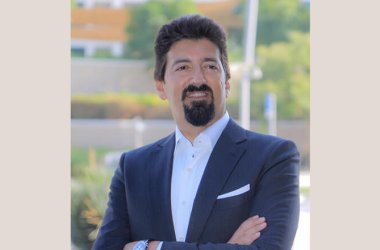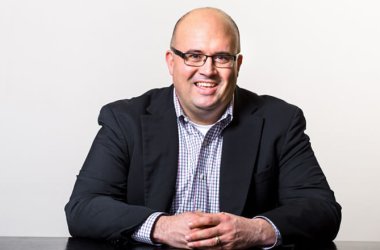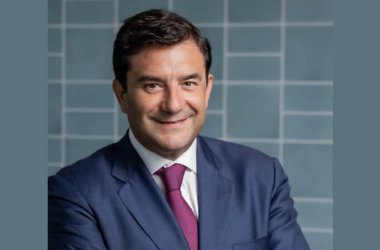Commercial Bank of Dubai CEO Dr Bernd van Linder is a rare commodity in his heavily-digitised industry. Boasting a PhD in artificial intelligence, the tech-minded leader joined CBD in January, and looks the perfect fit to guide the firm into the end-to-end digital age. James Dartnell caught up with Dr van Linder at the recent CFO Strategies Forum MENA.

While debate rages on as to which responsibilities for digitalising an organisation lie where, having a CEO – the figure with whom the buck always stops – with proven technology credentials is sure to offer a substantial head start.
Joining Commercial Bank of Dubai in the company’s hotseat in January 2017, Dr Bernd van Linder is now sure to draw envious eyes from across an industry – and region – where the pace of technological change has gathered serious momentum over the last 18 months. Banking, perhaps more so than any other industry, is under pressure to put all of its services at its customers’ fingertips.
In the midst of this transition, van Linder is extremely conscious of the responsibility that he must bear if CBD is to succeed in the digital age, and believes that having a tech-minded CEO is just as important as possessing a business-minded CIO. “No c-suite executive can get away with saying ‘I don’t like or understand technology,’” he says. “That’s not sustainable. In this day and age, and particularly in a data-intensive industry like banking, the CEO and the c-suite have to understand technology. The flipside of that is that the CIO has to have a deep enough understanding of the business to be a credible conversation partner for the c-suite. We’re lucky at Commercial Bank of Dubai that we’re covered in both respects.”
After completing a Master’s course in computer science in his formative years, van Linder’s thirst for technological knowledge compelled him to continue his studies before venturing into the world of work. He opted to undertake a PhD in artificial intelligence at the University of Utrecht in the Netherlands, and to this day, the course of study continually proves to be a shrewd move. “It has definitely helped me a lot in my subsequent career,” he says. “It’s been particularly useful in terms of problem analysis and structuring solutions to problems, as well as concise writing and reporting.”
Although van Linder acknowledges that technology has evolved “significantly” since he left university, the fundamental principles that underpinned his studies have endured. “I think it took about 20 years for AI to become fashionable again after I’d finished my thesis,” he quips. As global technology giants have laid their bets with investments in smart machines, van Linder believes that AI will become a staple of business, but remains a topic that is, for many, cloaked in mystery. “AI has become the buzzword of 2017,” he says. “I’m not sure if too many people understand what it means, but’s definitely not a question of hype,” he says.
Van Linder believes that the substance behind this evolution is Moore’s Law, and that humanity has reached a point where a once-futuristic fantasy now sits on our doorsteps. “When I did my thesis, there were two schools of thought,” he says. “One tried to model AI based on human intelligence. The other said that we should keep throwing more computing power at things, and if we keep doing that then we’ll get deep neural networks, which results in something that looks like intelligence. I belonged to the first school of thought, and with hindsight that was clearly wrong. The one that focused on massive computer power has won, and there is massive added value coming out of that. Whether that can actually be classed as ‘intelligence’ is more of a philosophical debate, but in terms of decision support, and analysing massive amounts of unstructured data, there is clearly great added value in AI as we currently see it.”
The key challenge for van Linder, and Commercial Bank of Dubai, is to opt for technology that can deliver value, instead of vanity. As a number of banks across the region have opted for eye-catching technology launches, van Linder is in no doubt where the biggest gains can be made. “The main area of added value is the digitisation of all end-to-end processes,” he says. “Anybody can build an app, and there are all kinds of frameworks in place – apps to build apps. Digitising end-to-end processes – taking out paperwork and human intervention, making sure things are straight-through, seamless, error-free – that’s where the biggest challenge is. It’s also where the biggest opportunity is. That’s not a fad. That will reduce operating costs for banks, and substantially improve the experience for the customer.”
After just under a year in the role, van Linder has already begun to initiate a measure of technology change at CBD. Looking forward, he has grand plans for the firm, and has laid out a transformational roadmap that will be driven by technology, but will not abandon the human touch. “CBD will be a different bank in five years’ time,” he says. “It will be default-digital for retail and corporate clients, and will offer a seamless, fast, error-free experience. It will still have a substantial number of branches because there will be human interaction required in various ways. Branches will be much more focused on the service element rather than the sales element. We may have less branches in future, but there will always be a role for them.”
For the full-length interview with Dr Bernd van Linder, make sure you read the February issue of CNME magazine.





